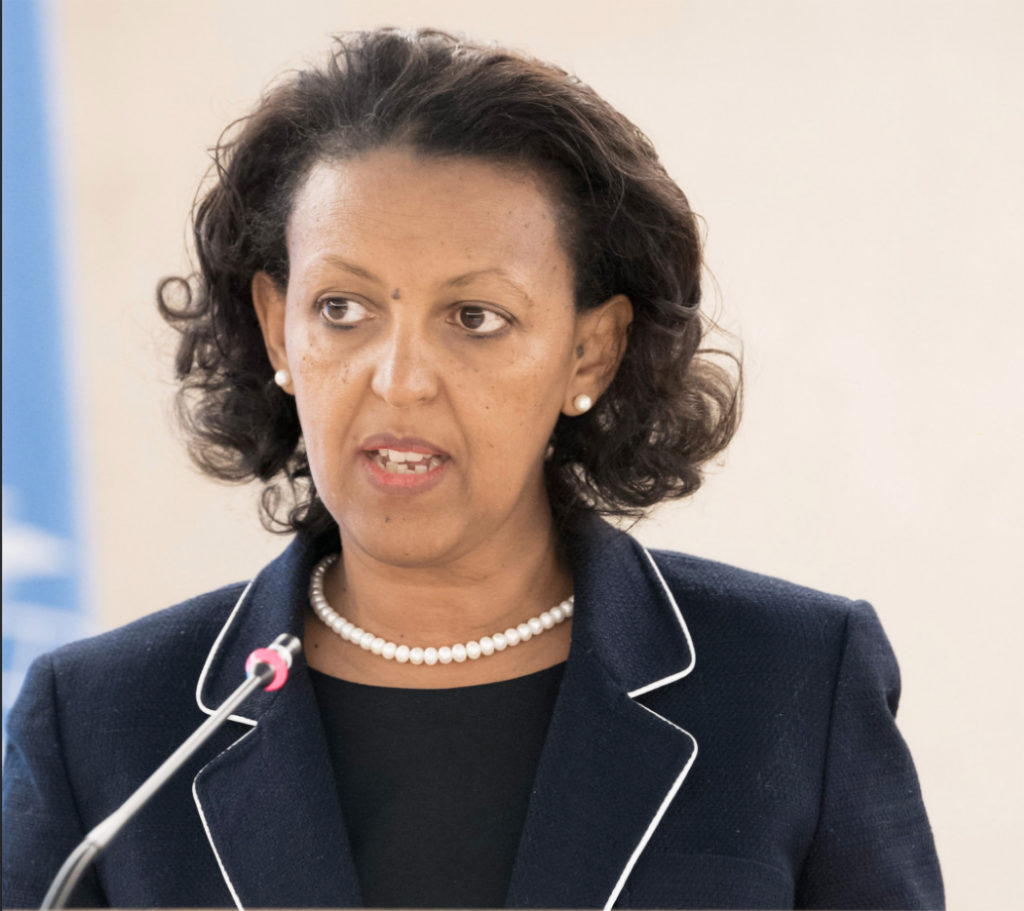H.E. Ambassador Hirut Zemene, Extraordinary Plenipotentiary Ambassador of the F.D.R of Ethiopia to Belgium, Luxembourg, and EU Institutions.
1. Excellency, how would you present Ethiopia from an economic point of view?
Firstly, I would like to thank you as a newly appointed Ambassador for giving me this opportunity. To start with your question, Ethiopia is one of sub-Saharan Africa’s fastest growing countries. It is a country with a population of 110 million, of which over 70 per cent of the population earns a living from the land mainly as subsistence farmers. Agriculture is the backbone of the national economy, and coffee, oilseeds, pulses, and flowers are the main exports from this sector. The growing livestock sector is also developing, exporting leather and leather products.
Ethiopia’s economy, as one of the world’s fastest-growing economies, has achieved double-digit broad-based growth in the past 15 years. We made substantial progress towards the Millennium Development Goals. At the end of the 5-years Growth and Transformation Plan II (GTP II) period, the proportion of our population living below the poverty line declined from 44 percent in 2000 to around 19 percent in 2020.
This rapid economic growth, coupled with a favorable investment climate, a large market size and a high level of government commitment to attract FDI, have contributed to the growth of FDI inflows into the country.
Ethiopia is the largest recipient of FDI in East Africa and the fourth largest in the continent after Egypt, Algeria and Nigeria.
The new government that assumed leadership in the past two years, is carrying out massive political and economic reforms to make it easier to do business in the country. A new plan known us Home Grown Economic Strategy is rolled out and is being implemented. It focuses mainly on setting the stage for the private sector to have a significant role in the economy. It is also planning to partially privatize government owned enterprises such as telecom and power.
More sectors will be drawn into economic priorities such as tourism and mining.
Apart from the government’s commitment to creating favorable policy frameworks, the excellent climate, fertile soil, affordable and workable labor force, access to a wide market, improved economic infrastructure and competitive incentive packages are some of the advantages for investors.
2. How would you describe the bilateral relations between Belgium and Ethiopia?
Ethiopia and Belgium have a long history of diplomatic relations since 1906, when the Government of Belgium first opened its embassy in Addis Ababa, making it the 5th country to do so. Belgium played a significant role in the establishment and training of Emperor Haile-Selassie’s close protection forces known as “Kibur Zebegna”. Since then, the two countries have exchanged visits at the level of Heads of State and Ministers,
as well as signed various agreements aimed at strengthening relations between the two countries. Among other things, the development cooperation agreement of 1997 which ended in 2006 could be taken as an example. Academic cooperation has now become the driving force behind relations between the two countries, making more than 3000 Ethiopian students and 10 public universities beneficiary from the collaboration.
As far as economic diplomacy is concerned, there are about 22 Belgian companies investing in Ethiopia and Belgium is one of the top trading partners of Ethiopia. Belgium is the fifth destination for the export of Ethiopian coffee, which is our primary export and you might also know that Ethiopia is the origin of Arabica coffee.
Existing relations between the two countries are as strong as ever and I would certainly work towards strengthening existing areas of cooperation and opening a new path to widening collaborations in both bilateral and multilateral forums. We were pleased to receive His Majesty the King of Belgium and his family during his family visit in Ethiopia. My president had the honour of hosting him and exchanging views on strengthening the bilateral cooperation.
3. What are the key sectors in which you would advise Belgian investors to invest in Ethiopia?
Generally speaking, the strategic sectors for foreign investment in Ethiopia include agriculture, textiles and clothing, leather and leather products, pharmaceuticals, agro-processing, ICT and mining, among others. I believe that all these sectors can involve Belgian investors. However, the agro-processing, horticulture, pharmaceutical and mining sectors would be more effective investment areas for Belgian companies. Most importantly,
it would be very productive for companies to invest in private equity in Ethiopia. This area of investment has a large potential.
In addition, issues related to information communication technology, such as mobile banking and digitalization, are also very captivating to invest in. On a joint venture basis, logistics sector is also open to foreign investors and I am sure that Belgian logistics companies will be interested in participating in this lucrative business.
4. Your embassy is the first point of contact for Belgians who are here. How do you help them? Are there other agencies that it is important to be in contact with?
Yes, our embassy is the first contact for Belgians and Luxembourgers who want to invest in or start trading in Ethiopia and visit Ethiopia. We provide first-hand information on investment opportunities and our export items (for merchants). For investors or merchants, we also facilitate activities by organizing visits to Ethiopia, organizing appointments with concerned Ethiopian authorities and companies, providing samples for potential buyers of Ethiopian products, and addressing the challenges they may face in the process. Likewise, for tourists, the embassy provides information about the country and its stunning tourist destinations.
The embassy has departments working specifically on the promotion of investment, foreign trade, tourism and technology transfer. These departments are responsible for providing the services I mentioned above to the Belgians and the Luxembourgers.
Regarding other important agencies to be in contact with, the Ethiopian Airlines Benelux Area Office, located in Diegem, Brussels, is a representative office of the largest airline in Africa. It operates daily flights from Brussels to Addis Ababa and has around 30 cargo flights per week from Addis Ababa mainly to Liège and Brussels.
5. What are your objectives/projects as a new Ambassador?
Speaking of economic diplomacy, as I also tried to point out earlier, Belgium is one of the top trading partners with Ethiopia. I will do my best to work to strengthen this trade relationship; we need to provide a much larger quantity of coffee to the Belgian market and to Europe in general. Belgium, having Port of Antwerp as the largest coffee transit port in Europe, and being one of the largest green coffee re-exporters in the continent, its huge potential remains available. We want to make sure that all Belgians and the rest of Europe enjoy our delicious Arabica coffee, the coffee from its origin. You know that we are branding Ethiopia as the “Land of Origins” because it is the origin of coffee, the cradle of human beings, and ancient civilization, among others. I will therefore work towards expanding the market opportunities in Belgium for Ethiopian products, in particular coffee.
Secondly, I will be focusing on attracting more foreign direct investment both from Belgium and Luxembourg. In connection with this, I believe there is a potential in Belgium to get as many investors as possible who can engage in Private Equity Investment in Ethiopia.
Thirdly, the promotion of tourism will also be of my focus. Besides the other tourist attraction sites in Ethiopia, Addis Ababa as a metropolitan city and the seat of our continental organization the African Union, has made a major face lift by providing a number of historical and scenic sights open to both local and international tourists. The Unity Park and Sheger projects were initiated by our Prime Minister and have been built to add significant values to Addis Ababa’s tourist attraction. As a result, the old palace is open for visits after its more than a century of existence; The highest pick of the city at Entoto mountain and the natural hot spring of the city are converted into a tourist paradise hence contributing tremendously to the growth of the tourism sector.
6. Is there a message you would like to send to our members?
My general message to the esteemed members is that now is the time to invest in Ethiopia. It is one of the fastest-growing countries in the world with a favorable investment climate and attractive incentives. We also have a successful industrial park development that has made it easy for investors to get all the services they need at a single point. Come and join our industrial parks, enjoy the market opportunities we have (local market of 110 million consumers, with duty free access to AGOA, EBA, AfCFTA, proximity to the Middle East and Asia) and take advantage of the political and economic reforms underway to make business in Ethiopia easy.
At the Embassy of Ethiopia both me and my team are at your disposal for any assistance you may seek in this regards; we facilitate your business trips to Ethiopia, providing you with first-hand information on investment, trade, tourism or technology transfer to Ethiopia.
7. Covid-19 Special: How would you describe Ethiopia’s fight against Covid-19? What support has been put in place for Belgian investors?
As you know, the spread of this global pandemic has caused damage not only to people’s health and lives, but also to the economy around the globe. Following the outbreak of the virus in Ethiopia, the government declared a public health emergency involving contact tracing and compulsory quarantine. Public awareness campaigns included regular announcements by the Prime Minister and the daily provision of transparent information by the Ministry of Health. Health professionals, prominent personalities, influential politicians and multiple media outlets including Ethio Telecom, which included mandatory mobile phone ring tones used to reinforce the precautionary measures, have aggressively campaigned for hand-washing and social distancing.
Mass mobilization of emergency resources was made and resulted in the temporary conversion of public universities into quarantine centers and the transformation of Millennium Hall, the country’s largest conference center, into a 1,000-bed temporary hospital. College students of health care related fields, volunteers, and retired health care professionals were also called upon to join forces in the fight against the pandemic.
The impact of COVID-19 has extended beyond the public health emergency and the economy, leading also to the postponement of national elections.
To halt the effect of the pandemic on the national economy, the government has introduced a support package targeting manufacturing exporters (investors). The support package was aimed at preventing the closure of firms and lay-offs of workers. Labor confederations, employers, and the government agreed on a tripartite protocol, and a comprehensive COVID-19 action plan was implemented in industrial parks.
A logistics subsidy including free rail transport and reduced dry-dock and air freight charges was also introduced to support manufacturing exporters. Additional measures such as allowing exporters to sell in local markets were permitted to improve cash flow. The factories and industrial parks have also been repurposed to manufacture personal protective equipment (PPE) needed for prevention of the pandemic. I believe the Belgian companies investing in Ethiopia have also benefited from this support package introduced by the government.
The Ethiopian Airlines as you may know has made a very exemplary adaptation mechanism by turning around its worldwide ventures into a cargo delivery flights. This has made it possible for the airline not only spare its employees from lay-off but has made a good business in times of crisis. It is one of the airlines that has not interrupted its flights to Belgium even during the heights of the COVID but keeping its standard procedure of prevention.
My Prime Minister has championed important initiatives during challenging times that go beyond Ethiopia. Firstly, he took the initiative in campaigning for global debt moratorium for least developed countries that are suffering from the pandemic and I think this was a welcome development by the G20. Secondly, he has led the initiative together with Jack Ma Foundation to transport to all African countries through the Ethiopian Airlines, testing kits, masks and Health Personal Protective Equipment.
In conclusion, I would say that the government of Ethiopia has taken important initiatives to take adaptive and creative approach to manage challenges of human live, business environment and expressing global solidarity to tackle head on this challenging times.
Thank you!
![[:en]shutterstock_391166113 (1)[:]](https://perspectives-cblacp.eu/wp-content/uploads/2020/10/shutterstock_391166113-1-696x464.jpg)



